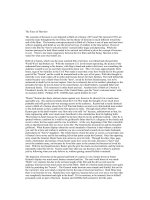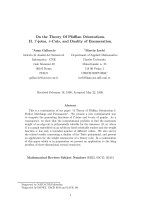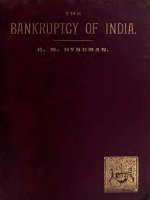the farce of heroism an opinion paper on heroism
Bạn đang xem bản rút gọn của tài liệu. Xem và tải ngay bản đầy đủ của tài liệu tại đây (35.49 KB, 2 trang )
The Farce of Heroism
The concepts of heroism in war depicted in Birth of a Nation (1915) and The General (1927) are
much the same throughout the two films, but the theory of heroism is much different toward the
end of the films. The heroism concept portrayed in Birth of a Nation is one of pure and true heart
with no stopping until death as was the perceived way of soldiers in the time period. However
later in the film the "hero's welcome home" seemed rather tragic and depressing. While the
heroism portrayed in both films tended to be satirical and offered a jab at the concept of heroism
in war. There is one main congruency between the two films and that being: Heroism is best
suited for what your true beliefs are.
Birth of a Nation, which was the most watched film of all time, was filmed and released after
World War I had broken out. With the imminent U.S. involvement upcoming, the picture of the
undaunted hero running to his demise, with flag in hand and pride in his heart, was something the
audience wanted to see to ease their insecurities about war. This very long, approximately three
hours, saga of two families in the Civil War made it seem that a true hero would die for the greater
good of the "Nation" and he would be immortalized in the eyes of his peers. With this thought in
mind the every male rushes off to enlist and become heroes for their families. The truth behind the
matter became very evident when first the "hero", saved by his best friend/enemy, was to be
sentenced to death by his saviors/captors. Once he is released, due to his mother's pleadings to the
president for him, he travels home to his ruined home, two dead brothers, wounded father and
destroyed family. This statement is rather harsh and real. Another hero of Birth of a Nation is
President Lincoln, the victor and hero of the United States, gets his "hero's welcome home" with
an assassins bullet. Perhaps D.W. Griffiths had a great disdain for war?
"Buster" Keaton also had a stalwart stance against war, however he showed it in a much more
agreeable way. His satirical comedy about the Civil War made the thought of war much more
palatable and still got the anti-war message across to the audience. Keaton had a nearly identical
scene to Birth of a Nation where the Civil War had broken out and every able-bodied man rushed
to the draft points so they could be the first person to enlist. Through much effort "Buster"
Keaton gets to the draft window very first only to be told "no" because, unbeknownst to him, his
train engineering skills were much more beneficial to the confederates then his fighting skills.
This breaks his heart because he couldn't be the hero that his lovely girlfriend wanted. After he is
spotted without a uniform he is told by the girlfriend's father that he is a disgrace to the family and
never to show his face again until he was in uniform. At the very beginning of the film a intertitle
tells us that Buster had only two loves in his life: The General (his locomotive) and his beautiful
girlfriend. What Keaton displays about the social standards of heroism is that without a uniform
you can't be a hero and without a uniform you are a coward and cowards do not make husbands,
particularly for "hero's" daughters. The whole theory of join the army or you're a coward takes one
of buster's loves away and he has nothing left at that point except the General. Once the opposing
army steals the General, Buster busts into action to save his train. Through his slips, trips, gags,
stunts, misfortunes and strokes of luck buster some how saves his train, becomes a "hero" and
saves the southern army, not because he loved the cause or the country but because he loved his
train. With his newfound heroism, Buster gets the girl, the much-coveted uniform, and the train he
repeatedly risked his life for. Keaton states here that you can become a hero without a uniform
just by following what you truly believe in, without getting yourself killed or maimed.
The depiction of heroism in the general and birth of a nation is very similar however buster
Keaton's display was much more fantasy oriented and fun. The real world threat of war made
"Birth" very realistic but due to the extreme length of the film and the all too real tone the
audience must have been much more moved by Birth. Birth of a Nation made heroism seem quite
futile by punishing the "heroes". The General made heroism seem simple and fruitful, but not for
the war hero's who were dead or injured, but for the man of true heart and love. Both films limn
there is no heroism in war. Maybe they were right too, because have you ever met a war hero that
was completely functional and right in the head? If it is necessary to be maimed, shot or killed I
personally want no part of heroism. Keaton and Griffiths both seemed to feel the same.









![kwon et al - 2014 - the effect of mandatory audit firm rotation on audit quality and audit fees empirical - evidence from the korean audit market [mafr]](https://media.store123doc.com/images/document/2015_01/06/medium_har1420548188.jpg)